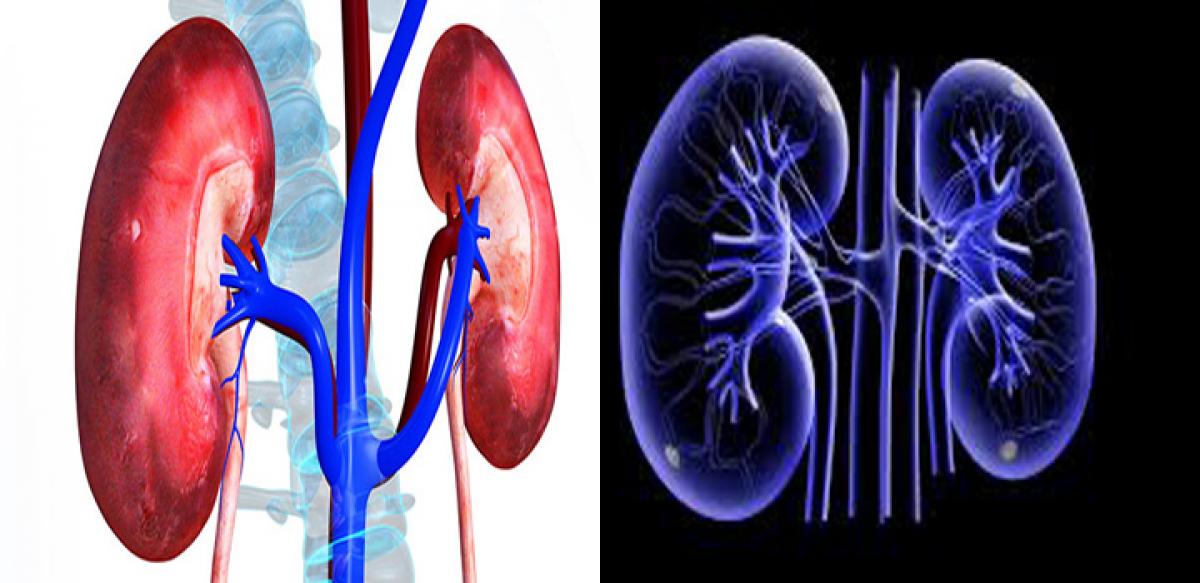Live
- India leads world in science, innovation research: Minister
- Flash flood in Indonesia's South Tapanuli claims two lives
- MahaYuti's electoral success testament to leadership of PM Modi, HM Shah: Ajit Pawar
- Unproven remedies: Tata Memorial Hospital slams Sidhu’s viral ‘diet cure’ cancer claim
- People voted in favour of development, rejected negative politics: CM Shinde
- Rajasthan bypolls: CM Bhajan Lal Sharma's governance credited with BJP's impressive show
- Aaditya Thackeray retains Worli defeating Shinde faction nominee Milind Deora
- Over 20 Injured in Multi-Vehicle Collision on Mangaluru-Bengaluru Highway
- South Korea not to attend Sado memorial amid controversy over Japan's pick for government representative
- Five major factors that helped MahaYuti to win landslide victory
Just In

Kidney disease is a silent disease. The initial stages of the kidney disease are usually asymptomatic and some conditions progressively cause worsening kidney functions. The process slowly continues for several years by progressively altering the structure and function of the kidney. This slow progression of kidney disease leads to End-Stage Renal Disease and then the symptoms start to appear.
Kidney disease is a silent disease. The initial stages of the kidney disease are usually asymptomatic and some conditions progressively cause worsening kidney functions. The process slowly continues for several years by progressively altering the structure and function of the kidney. This slow progression of kidney disease leads to End-Stage Renal Disease and then the symptoms start to appear.
Can the early detection and management of kidney disease prevent the deterioration of kidney function and reduce the complications associated with it such as cardiovascular diseases; and, is there any medication that can help delay the progression of kidney disease? Now, to know the answer, let us first understand what chronic kidney disease is, its causes and how it impacts the body.
What is Chronic Kidney Disease?
Chronic Kidney disease (CKD) is a progressive loss of kidney function over a period of time ranging from months to years. Each kidney has about a million tiny filters called nephrons. When nephrons get damaged, they stop working. Over a period of time, the remaining nephrons become incapable to filter blood efficiently and toxins get accumulated in the body. This is known as kidney failure.
What are the causes of CKD?
For most kidney diseases, Diabetes and High Blood Pressure are the common causes. For End Stage Renal Disease, diabetes is the major factor. Chronic kidney disease may sometimes be inherited (polycystic kidney disease) or may be a result of infections, inflammation or due to longstanding blockage to the urinary system (kidney stones or enlarged prostrate). Use of Pain killers, like analgesics or antibiotics, for prolonged periods of time may also cause chronic kidney disease. A kidney biopsy helps to determine the cause of Kidney disease.
Are Kidney Diseases Harmful?
Kidney diseases are harmful for anyone irrespective of age or sex. Many people die prematurely owing to the complications pertaining to Chronic Kidney Diseases (CKD). Chronic Kidney Disease, if not treated properly will lead to kidney failure i.e., End-stage renal disease, (ESRD).
Chronic Kidney Disease (CKD) also increases the risk of anemia, bone disease & cardiovascular disease. Most patients with kidney disease don’t die of kidney failure; they die because of heart attacks or other complications.
How is kidney function measured?
Creatinine is a waste product of the body, which is produced by the muscles and excreted by the kidneys. In case of kidney problems or reduced kidney functions, creatinine accumulates in the blood and its level alleviates. A blood test is done to check the creatinine level, which acts as an indicator of kidney function. From the measurement of the blood creatinine levels, another indicator called GFR (Glomerular Filtration Rate) that measures the rate of filtration by kidneys can be easily estimated. This indicator helps us determine the approximate percentage of kidney function.
How can CKD be treated?
Kidney damage or impairment of kidney function can be slowed down or checked and the risk of associated heart diseases can be minimized if Chronic Kidney Disease is detected early and controlled appropriately. In the early stages of the kidney disease, a proper diet and medications may help to maintain the critical balances in the body that kidneys normally control.
Sometimes protein leak in urine can also cause kidney function impairment. Controlling blood pressure and reducing proteinuria with medicines can prevent the progression of kidney disease. Treatment done on time can stop the progression of kidney disease and prevent development of other serious conditions.
There are two treatment options for End Stage Renal Disease: dialysis and kidney transplant. The wastes that accumulate in the body are removed either by hemodialysis (dialysis done by machine) or by peritoneal dialysis (by using fluid in the abdomen). However, the best way to restore normal kidney function is kidney transplantation.
By: Dr Kavitha Gone
MRCP (UK), CCT (Nephrology & General Medicine) (UK) Senior Consultant Nephrologist and Transplant Physician Continental Center for Kidney Diseases & Renal Transplant Continental Hospitals: www.continentalhospitals.com Ph: 7799661661

© 2024 Hyderabad Media House Limited/The Hans India. All rights reserved. Powered by hocalwire.com







